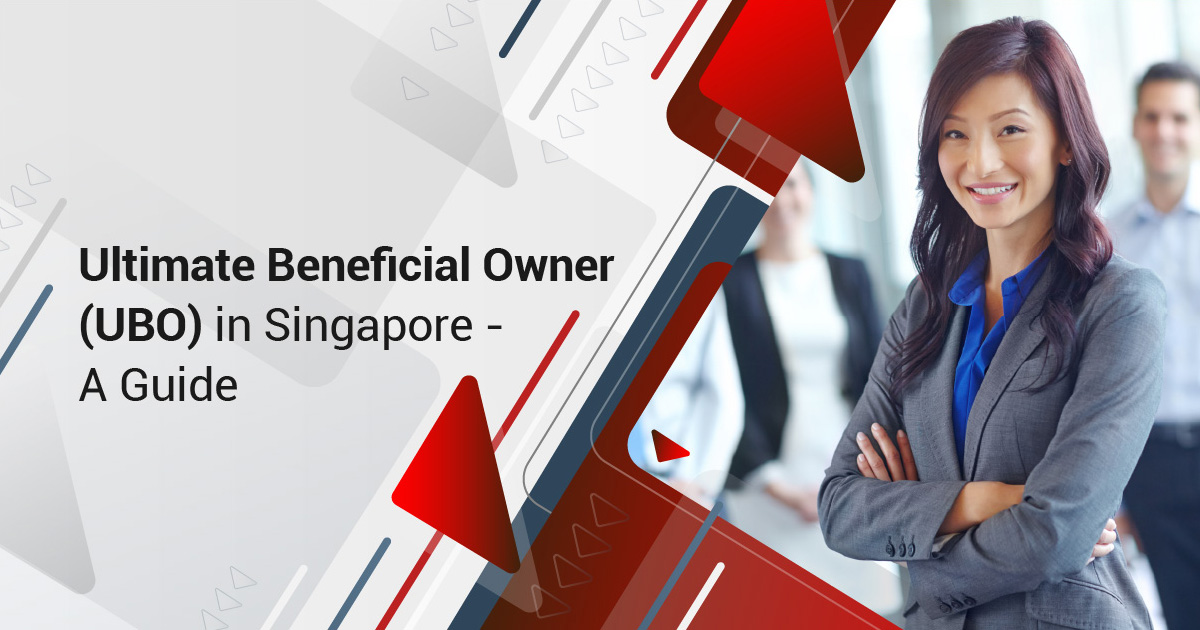Understanding who truly controls a business is not just a regulatory requirement – it is a critical step toward fostering trust and safeguarding the financial ecosystem. This is where the concept of Ultimate Beneficial Ownership (UBO) comes into play.

A UBO refers to the individual who ultimately owns, controls, or benefits from a company, even if they are not directly listed as stakeholders. For businesses operating in Singapore, complying with UBO regulations is not optional. Stricter corporate governance measures have been introduced to combat financial crimes such as money laundering and tax evasion, making it essential for companies to maintain accurate and up-to-date UBO records.
By ensuring full compliance with UBO requirements, companies can promote transparency, protect their reputations, and build lasting trust with stakeholders. This guide will equip you with the knowledge needed to understand UBO obligations in Singapore, ensuring your business remains compliant while contributing to a fair and open financial landscape.
Key Takeaways
- In Singapore, an Ultimate Beneficial Owner (UBO) is defined as the natural person who ultimately owns or controls a company or legal entity.
- Identifying UBOs promotes transparency in corporate structures, reducing the risk of hidden ownership and illicit activities.
- Adhering to UBO regulations ensures alignment with Singapore’s anti-money laundering (AML) and countering the financing of terrorism (CFT) frameworks, avoiding penalties and legal issues.
- Non-compliance with UBO regulations, such as failing to maintain an accurate Register of Registrable Controllers (RORC), can result in monetary fines and other penalties under the Companies Act.
What is an Ultimate Beneficial Owner in Singapore?
According to the Financial Action Task Force (FATF), the independent inter-governmental body that creates and promotes policies to protect the global financial system, a UBO refers to the natural person who ultimately owns or controls a customer and/or the natural person on whose behalf a transaction is being performed.
According to the Institute of Singapore Chartered Accountants (ISCA)’s AML guidelines, the beneficial owner refers to:
- An individual who ultimately owns all of the assets or undertakings of the client
- An individual with ultimate control or ultimate effective control over, or has executive authority in, the client
- Individuals who own at least a 25% share or voting rights in a business
Where Does Beneficial Ownership Apply in KYC Processes?
KYC is a process used by businesses, particularly financial institutions and Designated Non-Financial Businesses and Professions (DNFBPs), to verify the identity of their clients. It is a critical component of compliance and risk management frameworks, designed to prevent illegal activities such as money laundering, fraud, and financing of terrorism.
The Customer Due Diligence process follows after, with the basic requirement of collecting customer information to verify and identify the customer’s identity for risk assessment. The main aim is to ensure that the individual or entity that the institution will create a business relationship is not illicit.
KYC and BO identification are essential for legal and natural persons because a person will be working on another person’s behalf without a legal arrangement. An individual who is presumably categorised as a BO must be subject to the KYC process until a natural person who owns or controls that legal person is identified.
Regulatory Requirements for UBO Compliance in Singapore

Singapore has established stringent regulations to ensure that businesses maintain proper UBO records. Here is an overview of the key regulatory requirements:
Maintaining a Register of Registrable Controllers
- Companies must maintain a “Register of Registrable Controllers” (RORC), which lists their UBOs or controllers. For new companies, they must maintain this register from the date of incorporation or registration.
- The RORC must include detailed information such as the individual’s full name, identification number, date of birth, nationality, address, and the nature of their control.
Updates and Accuracy
- The register must be updated whenever there is a change in beneficial ownership or the business structure. Changes should be reflected in the records within 7 calendar days after confirmation.
Filing With ACRA
- Businesses are required to file UBO information with the Accounting and Corporate Regulatory Authority (ACRA). While certain data is not made public, it must be accessible to regulators upon request.
Ongoing Monitoring
- Companies and LLPs must review their UBO records periodically to verify that the information remains accurate. Annual notices must be sent to controllers to confirm that their particulars are updated. Failure to obtain confirmation, or the committing of other offences related to the register of controllers, will incur a maximum fine of up to S$25,000, a significant increase from the previous amount of S$5,000.
Benefits of Complying With UBO Guidelines

UBO compliance is a key focus for regulatory bodies worldwide, including in Singapore. It aims to bring transparency to business operations, curb illicit financial activities, and ensure accountability in corporate structures. Below are some core reasons why UBO compliance is crucial:
Risk Management and Regulatory Compliance
Identifying the UBO can help determine the customer-specific risk of aligning with the company and its management. It can also enable the business to perform KYC processes and adhere to AML laws by knowing the identity with the biggest benefit from the business relationship.
Prevents Financial Crimes
UBO reporting helps combat money laundering, terrorism financing, and tax evasion by tracing financial flows to their ultimate beneficiaries.
Builds Business Trust and Confidence
Clear UBO records foster confidence among investors, clients, and regulatory authorities, strengthening your company’s reputation.
BO Identification Processes
There are recommended processes when it comes to collecting details of the BO. During customer onboarding, business entities should obtain documents and other key information. These details should include information such as the business’:
- Name
- Place of operation
- Nature of the business
- Registration number
The objective of these processes is to get relevant details of the business’ ownership, find out who controls the company, and who has the ability or influence to manage the transactions. Regulated entities can obtain documents to identify beneficial owners such as:
- The company structure
- Memorandum of Association
- Register of shareholders
- Senior Management
Obtaining information of the beneficial ownership is required if there is a substantial change in transaction or account activities.
Failure to Identify the UBO
UBO identification is linked to preventing the exploitation of illegal activities or financial crimes such as terrorism financing and money laundering. This forms part of the KYC process and, therefore, AML compliance. Hence, failure to do so would lead to significant penalties and reputational damage to financial institutions and DNFBPs for non-compliance.
Determine UBO and Stay Compliant With AML Regulations
Financial institutions and other regulated entities must implement a well-rounded AML or CFT framework to avoid penalties arising from non-compliance as AML laws are growing stricter. This trend is a result of increasing publicly known money laundering crimes and high-profile cases.
One important method of being prepared for these regulations is to create and administer a forward-looking approach to CDD and KYC measures. This includes robust KYC questionnaires and processes to delve into the legal person to understand the ownership and control interest.
This allows the business entity to have accurate details of the legal structure and the beneficial ownership of the customer to trace down the source of the financial crimes easily.
Engaging professional AML consultants would be the best recommendation for implementing a comprehensive AML/CFT framework. At InCorp, we can help you stay compliant with these regulations with ease. Contact us to find out how we can help!
FAQs about Ultimate Beneficial Owner (UBO)
What is the difference between a beneficial owner and the ultimate beneficial owner?
- Although these terms are used synonymously, a beneficial owner refers to the natural person or persons who ultimately own or control a customer, and/or the natural persons on whose behalf a transaction is being made. Basically, the two terms carry the same meaning.
What is the threshold for identifying a UBO?
- A UBO refers to the individuals who ultimately own or control a legal entity. It is defined as being a person who owns more than 25% of the company’s shares.
How can InCorp help with my UBO needs?
- Our experts can assist in the compliance process, including with AML and CFT regulations.


